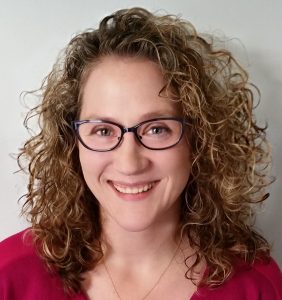Jan
07

Posted by liaison on January 7th, 2022
Posted in: #CC/Academic List, #Health Interest List, #Health Sciences List, #Public/K-12 List, All Members
 NNLM Region 4 is highlighting Katie Larsen, full-time Library and Information Sciences Student at Emporia State University, for her accomplishment of receiving her Consumer Health Information Specialization (CHIS) certification. Below Katie shares her experience in receiving and having her certification.
NNLM Region 4 is highlighting Katie Larsen, full-time Library and Information Sciences Student at Emporia State University, for her accomplishment of receiving her Consumer Health Information Specialization (CHIS) certification. Below Katie shares her experience in receiving and having her certification.
Can you give us the elevator-speech rundown of your librarian career?
I worked at the Salt Lake Community College, Markosian Library as a reference specialist for a year. I really enjoyed working with students through the college’s Online+ program. In this program I would help students plan for their research papers. This includes helping them with their research, finding library resources, and formulating a research question.
During the COVID-19 pandemic I decided to put all of my effort into finishing my MLS at Emporia State University (ESU). After I graduate, I would like to work as a health sciences librarian.
While in college, I participated in two practicums with the Network of the National Library of Medicine, Region 4. In the first practicum, I developed an efficient and human-friendly content management system to keep internal library documents and project-based content organized. Having a system in place, especially with a group online collaboration, saves a lot of time and effort. Recently, I had the opportunity to attend the 2021 MCMLA/Midwest Conference, where my practicum partner Kristi Torp and I presented a lightning talk about the project.
The second practicum project I participated in was a community health engagement project called the Proximity Project. We used a geo-mapping program (ArcGIS) to look at the proximity of public health centers, academic libraries, tribal libraries, public libraries, etc., that are close to one another. The tool allows the NNLM to connect with several organizations who have similar goals and are physically near one another for outreach, partnership, professional development, and funding. It was a lot of fun!
At ESU, I was able to do some fun things as well. Last Fall, I worked on a paper with Brenda Linares, Instructor for the School of Library and Information Management at ESU and Health Science Librarian at A.R. Dyles Library at Kansass University Medical Center, called LitCovid: A Database of Coronavirus Research. It was a great experience for me to submit a paper for the first time.
How did you hear about the CHIS Certification?
My advisor at ESU told me about a consumer health information course that allows students to earn the CHIS certification as a part of the class. ESU’s LIS program worked with the Medical Library Association on getting their course approved to offer CHIS certificates to their students. Other students and I were excited to hear about the opportunity.
Describe your experience with the CHIS Certification classes.
I took the class over the summer. The content was condensed to fit into the short semester, so it was a bit more challenging at the faster pace. However, I really appreciated the opportunity to earn the CHIS and receive course credit toward my degree concurrently. I learned a ton of useful information.
How has your CHIS certification helped you in your current role?
I was able to utilize the information and skills I learned in subsequent courses. It was helpful. I haven’t used the knowledge in a work environment yet but am looking forward to it in the future. There were unexpected aspects of the CHIS program that are very helpful. For example, ethical and legal topics in a public health setting. We as librarians need to keep ethical and legal aspects in mind when helping patrons with health information. We also discussed cultural awareness, and how it pertains to health librarianship. Everyone has different perspectives and needs when it comes to health. We must listen carefully to the needs and concerns of those we serve.
You also need to think about the different information formats you make available. People may want technical research information but prefer it in a language other than English. Some may not have strong literacy or health literacy skills. Availability of information in different reading levels, formats, or videos makes them accessible to more individuals.
It is essential to know what is important to the patron. We can’t guess or assume others think about health the same way we do. You just need to listen and ask additional questions.
Any advice for folks looking to earn their CHIS Certification?
Do it! It is well worth it. This certification is very helpful in a public library setting. That’s where you have people looking for answers about their health. For example, someone who has health-related questions after visiting their doctor (sometimes the questions don’t come until later) wants to learn more about their diagnosis. With online resources, people don’t always know if the information is reliable.